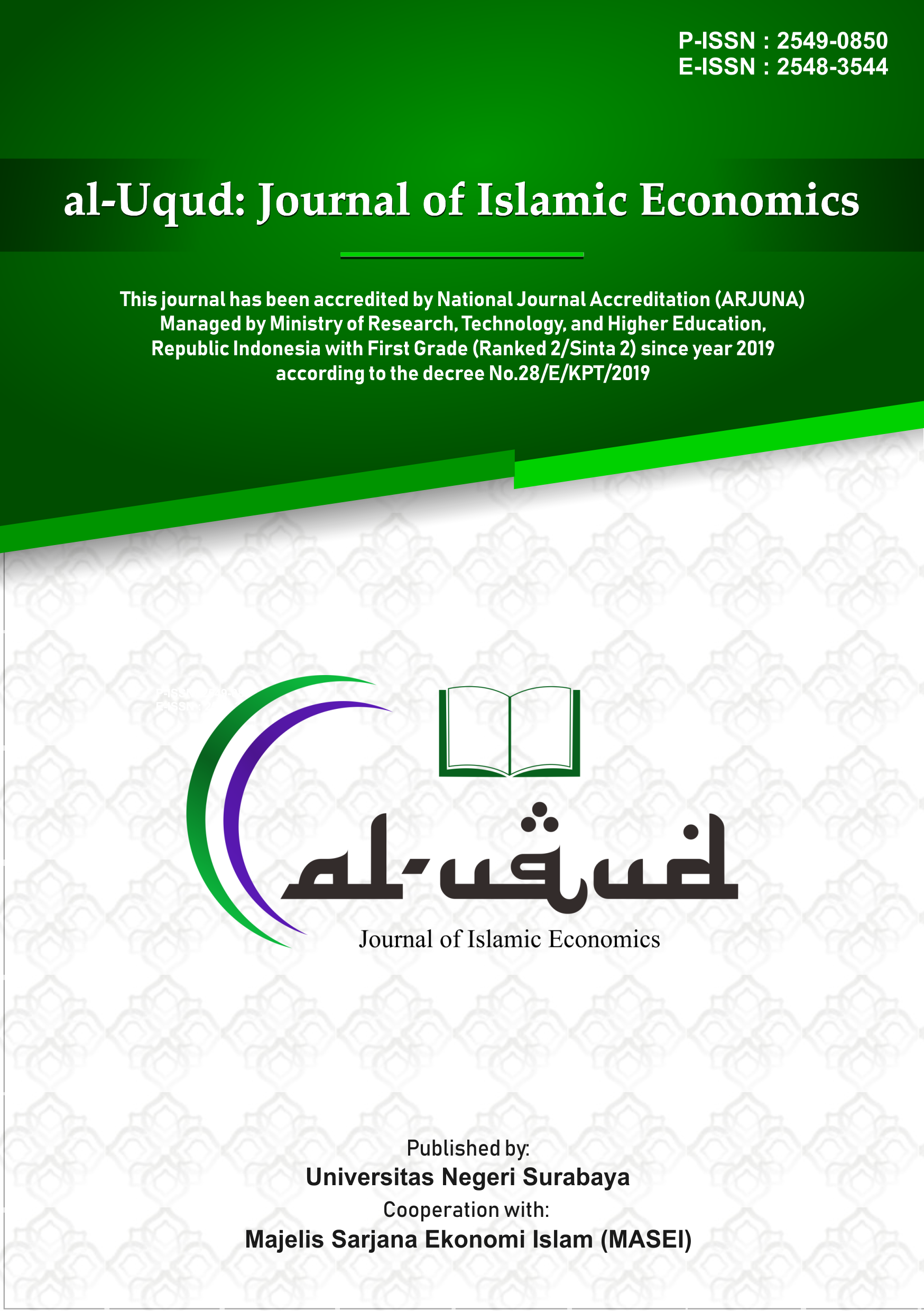Driving Islamic work performance from transactional leadership and the mediation role of job satisfaction in sharia retails
DOI:
https://doi.org/10.26740/aluqud.v8n1.p29-41Keywords:
Transactional leadership, Job satisfaction, Islamic work performance, Sharia retailsAbstract
This research aims to analyse the influence of transactional leadership on Islamic work performance through job satisfaction at Sharia retails in Indonesia. The research method used is explanation (explanatory research). The research sample consisted of Sharia Retail employees, totalling 88 respondents. The independent variable used in the results of this study is transactional leadership. The intervening variable is job satisfaction. Dependent variable on Islamic work performance. Data collection techniques using questionnaires. The analysis technique used in this research is PLS structural equation modelling. The research results show a direct influence of transactional leadership on Islamic work performance, and transactional leadership indirectly influences Islamic work performance through job satisfaction at Sharia retail. The indirect influence of transactional leadership on Islamic work performance shows that there is a direct influence of transactional leadership on job satisfaction, and job satisfaction also influences Islamic work performance.
References
Adams, J.S. (1965). Inequity in social exchange, in Berkowitz, L. (Ed.), Advances in Experimental Social Psychology, Academic Press, New York, NY, 276-299.
Anugrah, D., Ari, P., (2019). Mengetahui Pengaruh Kinerja Islam Terhadap Motivasi Islam, Komitmen Islam, dan Pelatihan Islam Pada Karyawan PT. Asuransi Takaful Keluarga Di Jakarta, Jurnal Ekonomi Syariah Teori dan Terapan, 6(11), 2252-2271.
Arvey, R. D. & Murphy, K. R., (1998). Performance Evaluation In Work Settings, Annual Review Psychology, 49, 141-148.
Azid, T., Asutay, M., & Burki, M. (2007), Theory of The Firm, Management and Stakeholders: An Islamic Perspective, Islamic Economic Studies, 15(1), 326-327.
Azmi, I., (2010). Islamic Human Resource Practices And Organizational Performance: A Preliminary Finding Of Islamic Organizations In Malaysia, Journal Of Global Business And Economics, 1(1), 45-56.
Azwar, S. (1997). Reliabilitas dan Validitas, Yogyakarta: Pustaka Relajar.
Angriani, M., Eliyana, A., Hastirullah, F., & Priyo, S. (2020), The Effect of Transactional and Transformational Leadership on Lecturer Performance with Job Satisfaction as the Mediation, Sys Rev Pharm, 11(11), 1263-1272.
Bass, B.M. & Avolio, B.J. (1995). The Multifactor Leadership Questionnaire for Research, Mind Garden, Palo Alto, CA.
Bass, B.M. (1985). Leadership and Performance Beyond Expectations; Free Press: New York, NY, USA,
Craig, James, C., & Robert M., (1999). Manajemen Strategi: Sumber Daya, Perencanaan, Efisiensi Biaya, Sasaran, Terjemahan, Jakarta: Elex Media Komputindo.
Creswell, John W., (2018). Research Design Qualitative, Quantitative & Mixed Methods Approaches, Los Angeles: SAGE
Darmanto, S., & Supriyadi, Y., (2022). Development Of Employee Performance Model Based On Transactional Leadership, Competency, and Job Satisfaction, Journal of Applied Management (JAM), 20(2), 35-45.
DeCenzo, David A., & Stephen P., (2005). Fundamentals of Human Resources Management, 8th Edition, John Wiley & Sons, Inc.
El-Ashker, & Wilson, R., (2006). Islamic Economics A Short History, Koninklijke Brill NV, Leiden, The Netherlands.
Ferdinan, (2006). Metode Penelitian Manajemen Pedoman Penelitian untuk Skripsi, Tesis, dan Disertasi Ilmu Manajemen, Semarang: BP UNDIP.
Filosofi bisnis menebar rahmat ala pesantren, http://www.kabarbisnis.com/read/2823476, 06 Oktober 2011 | 15:53 wib
Guest, E., (1997). Human resource management and performance: a review and research agenda, The International Journal of Human Resource Management, 8(3). 56-65.
Hoq, M., Z., & Norbani C. H., (2009), Innovativeness: Its Antecedents and Relationship to SME Business Performance, ANZMAC. 21-35.
Ingram, D. (2018). Transformational leadership vs transactional leadership definition, available at: https://smallbusiness.chron.com (accessed April 13, 2018).
Jameel, S., & Rahman, A. B., (2020). The Mediating Role of Job Satisfaction between Leadership Style and Performance of Academic Staff, International Journal of Psychosocial Rehabilitation, 24 (4), 1475-7192.
Jauhar, (2009). Maqashid Syariah, Alih Bahasa Khikmawati, Jakarta: AMZAH.
Karim, A., (2007). Ekonomi Mikro Islami, Jakarta: RajaGrafindo Persada.
Kirkbride, P. (2006). Developing transformational leaders: the full range leadership model in action, Industrial and Commercial Training, 38(1), 23-32.
Kreitner, R. & Kinicki, A. (2013). Organizational Behaviour, McGraw-Hill, New York, NY
Lan, Chang, Ching, & Lie-Ping, (2019). Influences of Transformational Leadership, Transactional Leadership, and Patriarchal Leadership on Job Satisfaction of Cram School Faculty Members, Sustainability, 11, 3465, https://doi.org/10.3390/su11123465
Locke, E.A, 1976, The Nature and Causes of Job Satisfaction, NewYork: John. Wiley and Sons
Malhotra, K., (2007). Marketing Research: An Applied Orientation. New Jersey: Prentice-Hall, Inc.
Nadjib, M., (2006). Etika Kerja dalam Ajaran dan Pandangan Masyarakat Islam, Jakarta: LIPI.
Nawawi, H, (1993). Metode Penelitian Bidang Sosial. Yogyakarta: Gadjah Mada University Press
Nazir, M., (2005). Metode Penelitian, Jakarta: Ghalia Indonesia.
Nurlina N, (2022). Examining Linkage Between Transactional Leadership, Organizational Culture, Commitment and Compensation on Work Satisfaction and Performance, Golden Ratio of Human Resource Management, 2(2), 54-62. https://doi.org/10.52970/grhrm.v2i2.182
Northouse, P.G. (2015). Leadership: Theory and Practice, 7th ed.; SAGE Publications, Inc.: Los Angeles, CA, USA,
Saleem, M., (2008). Fundamentals of Management in Islam, Journal of Management Sciences, 1(1), 27-39.
Sekaran, U., (2006). Metodologi Penelitian untuk Bisnis, Jakarta: Salemba Empat.
Sonnentag, S., & Michael F., (2003). Performance Concepts and Performance Theory, Psychological Management of Individual Performance., John Wiley & Sons, Ltd.
Sugiono, (2009). Metode Penelitian Kuantitatif, Kualitatif dan R&D, Bandung: Alfabeta.
Syed, J., (2008). An Islamic perspective of industrial relations: the case of Pakistan. Journal of Management, Spirituality, and Religion, 5(4), 417-440.
Syed, O., Djasriza J., & Fatimah P., (2007), Nine Islamic Management Practices and Habits In Islamic History: Lessons For Managers And Leaders, UNITAR E-JOURNAL, 3,(2), 32-45.
Tayeb, M. (2007). Islamic Revival in Asia and Human Resource Management.
Travis, E. (2018). A look at the benefits of transactional leadership style, available at: https:// smallbusinesschron.com (accessed April 13, 2018).
Wahyudi, B., (2002). Manajemen Sumber Daya Manusia, edisi Revisi, Bandung: Sulita
Widjajakusuma, M., & Ismail Y., (2003). Pengantar Manajemen Syariat, Jakarta: Khairul Bayaan Press.
www.depag.go.id
Yildiz, F., Mustafa H., & Ali, E., (2011). Construction of Multi Dimensional Performance Measurement Model in Business Organizations: An Empirical Study, Journal of Economic and Social Studies, 1(1), 33-51.
Werther, W.B. and Davis, K. (1999). Human Resources and Personnel Management, 5th ed., McGraw-Hill, New York, NY.
Winkler, I. (2009). Contemporary Leadership Theories, Springer, Dordrecht
Zadjuli. 2004. Etika Sebagai Landasan Moral Pembangunan Ekonomi Di Indonesia
Downloads
Published
How to Cite
Issue
Section
License
Copyright (c) 2024 The author(s)

This work is licensed under a Creative Commons Attribution 4.0 International License.
CC BY 4.0 Abstract views: 357
,
Abstract views: 357
, PDF Downloads: 356
PDF Downloads: 356








